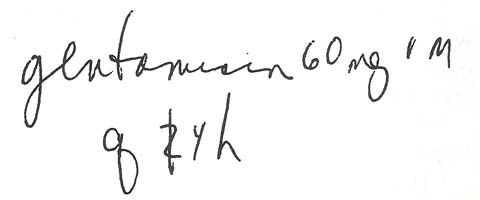
| Contents | Previous | Next |
A doctor ordered gentamicin, 60 mg, I.M., ql4h, to control a Pseudomonas infection in a patient who had severe renal impairment. He wrote the unusual dosage because gentamicin is especially dangerous for patients with renal disease unless it's given according to a specific calculated formula. When he doublechecked his calculations, though, he realized the order should have been q24h. But instead of crossing out the first order and rewriting it, he just wrote a "2" over the "I" in "14", so it looked like this:
|
|
When the nurse read the medication order, she thought the "2" had been crossed out and interpreted the order as q4h. She administered the first dose. Luckily, the charge nurse noticed the crossed-out number when she was reviewing the medication Kardex and checked it with the doctor. When she learned what he intended to order and compared that with what the nurse had given, she corrected the misinterpreted order before any more doses were given.
The highest recommended daily dose of gentamicin for patients with normal renal function is usually 5 mg/kg. So the nurse should have questioned a total daily dose of 360 mg for this 50 kg patient with renal disease.
Even if a doctor's written medication order is illegible, you can be held liable if you give the patient the wrong medication or dosage. So what should you do? Question anything on a medication order that could be interpreted more than one way. But the best way to protect a patient and yourself is to check the patient's diagnosis and the drugs prescribed to see if the order makes sense. And double-check anything crossed out on a medical order.